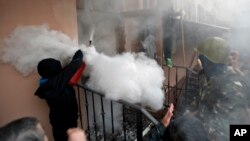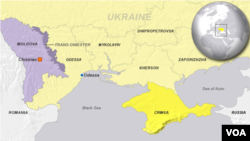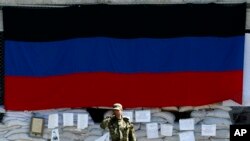Most of the unrest in Ukraine has been in the predominantly Russian-speaking eastern part of the country. But new disturbances in the last few days -- and a deadly fire that killed 42 mostly pro-Russian activists -- occurred far to the west in Odessa. It is a Black Sea port city that is important -- for different reasons -- to both Ukraine and Russia, and could prove to be a catalyst to even more violence.
Odessa is in southwest Ukraine, and with one million residents is the country's third largest city. It is about 700 kilometers from where Ukrainian forces are engaged in increasingly fierce fighting with pro-Russian militias in eastern Ukrainian cities. But Odessa caught the world's attention Friday when street clashes led to the fire that killed mostly pro-Russian insurgents, and on Sunday when protesters stormed the city police station to free some of the anti-Ukrainian demonstrators who had been arrested two days before.
By Monday, the Kyiv government dispatched a special police unit to the city to quell the violence after deciding that the Odessa police were incapable -- or unwilling -- to control the unrest.
One expert on former Soviet republics like Ukraine, University of New Hampshire political scientist Lionel Ingram, tells VOA that Odessa is crucial to both Ukraine and Russia.
"It's most probably the last great port that the Ukraine has on the Black Sea, in fact the last port it has at all, to give it access directly to the ocean," he said. "That's important to the Ukraine. It is important to Russia, for I believe, psychological and political reasons. It was a major place in relationship to the Russian revolution. That's also where they kept the fleet that rebelled against the czar."
But Ingram says the city could prove volatile if the national Ukrainian government cannot keep control.
"I think it's going to be a new flashpoint because, one, it appears the police there have behaved in the same fashion as they behaved as the police in the east," he said. "They have not been protective of the sovereignty of Kyiv. But more importantly, it's going to be a flashpoint which is going to be difficult for the Russians to take advantage of. The population there is much more Ukrainian-focused."
Political scientist Mark Schrad at Pennsylvania's Villanova University, another expert on the former Soviet republics, says it might not be easy for Odessa to keep the peace in the aftermath of the clashes of the last few days.
"I think with so many people losing their lives, and so many loved ones losing their lives, I don't think people are going to be willing to kiss and make up all that soon," he said.
In addition, he said the Odessa violence could reach Trans-Dniester, the narrow strip of Moldova farther west that wants to be part of Russia, even though the world at large does not recognize its announced intention.
"So there is a potential for instability there," Schrad said. "There is a suggestion that [Odessa] is something of a bridge between the rumblings in the east and then Crimea as well, and this volatile Trans-Dniester region in Moldova."
He says the violence in Odessa could embolden pro-Russian groups to start local uprisings in other cities, even if they are outnumbered in their communities by supporters of Ukraine.
Odessa is in southwest Ukraine, and with one million residents is the country's third largest city. It is about 700 kilometers from where Ukrainian forces are engaged in increasingly fierce fighting with pro-Russian militias in eastern Ukrainian cities. But Odessa caught the world's attention Friday when street clashes led to the fire that killed mostly pro-Russian insurgents, and on Sunday when protesters stormed the city police station to free some of the anti-Ukrainian demonstrators who had been arrested two days before.
By Monday, the Kyiv government dispatched a special police unit to the city to quell the violence after deciding that the Odessa police were incapable -- or unwilling -- to control the unrest.
One expert on former Soviet republics like Ukraine, University of New Hampshire political scientist Lionel Ingram, tells VOA that Odessa is crucial to both Ukraine and Russia.
"It's most probably the last great port that the Ukraine has on the Black Sea, in fact the last port it has at all, to give it access directly to the ocean," he said. "That's important to the Ukraine. It is important to Russia, for I believe, psychological and political reasons. It was a major place in relationship to the Russian revolution. That's also where they kept the fleet that rebelled against the czar."
But Ingram says the city could prove volatile if the national Ukrainian government cannot keep control.
"I think it's going to be a new flashpoint because, one, it appears the police there have behaved in the same fashion as they behaved as the police in the east," he said. "They have not been protective of the sovereignty of Kyiv. But more importantly, it's going to be a flashpoint which is going to be difficult for the Russians to take advantage of. The population there is much more Ukrainian-focused."
Political scientist Mark Schrad at Pennsylvania's Villanova University, another expert on the former Soviet republics, says it might not be easy for Odessa to keep the peace in the aftermath of the clashes of the last few days.
"I think with so many people losing their lives, and so many loved ones losing their lives, I don't think people are going to be willing to kiss and make up all that soon," he said.
In addition, he said the Odessa violence could reach Trans-Dniester, the narrow strip of Moldova farther west that wants to be part of Russia, even though the world at large does not recognize its announced intention.
"So there is a potential for instability there," Schrad said. "There is a suggestion that [Odessa] is something of a bridge between the rumblings in the east and then Crimea as well, and this volatile Trans-Dniester region in Moldova."
He says the violence in Odessa could embolden pro-Russian groups to start local uprisings in other cities, even if they are outnumbered in their communities by supporters of Ukraine.






